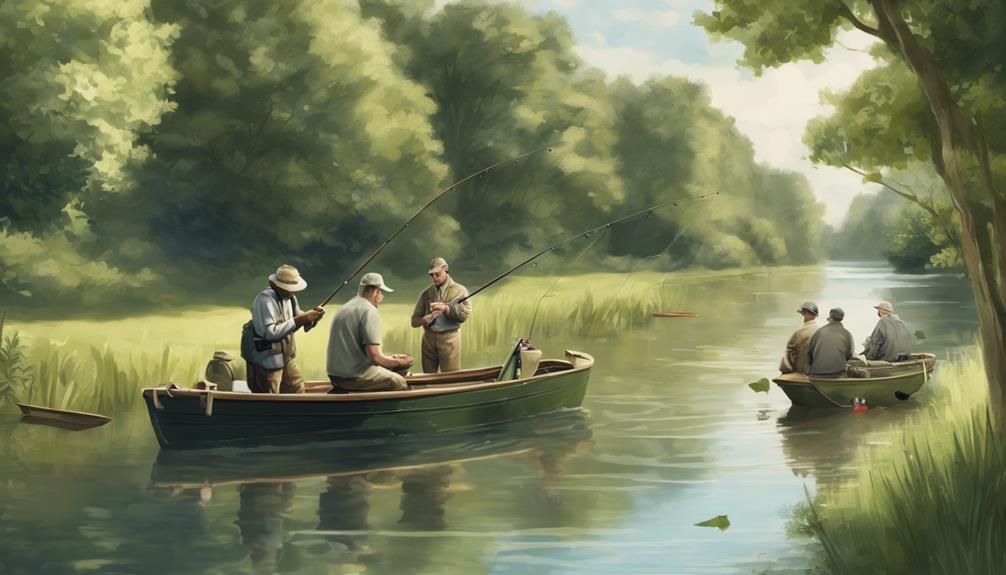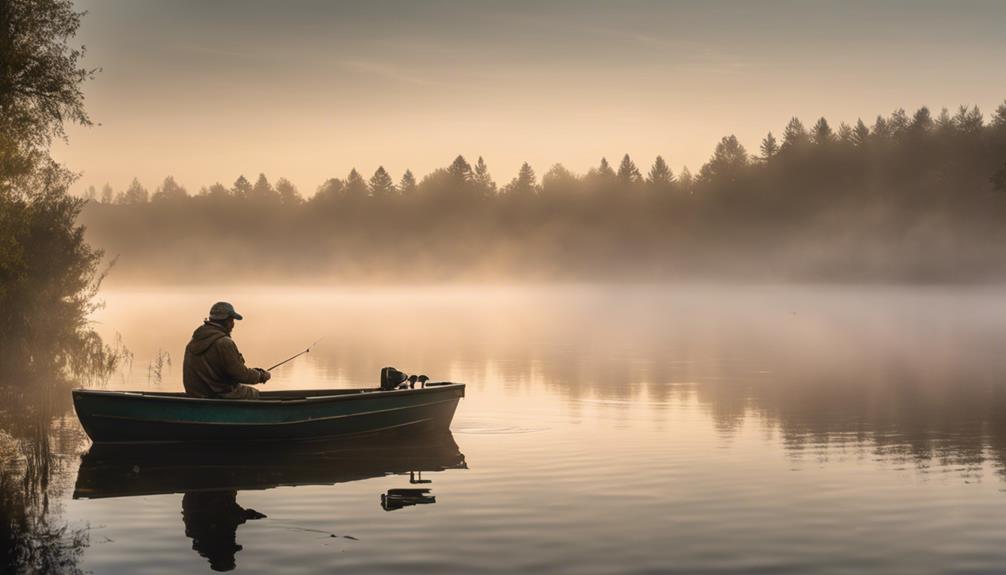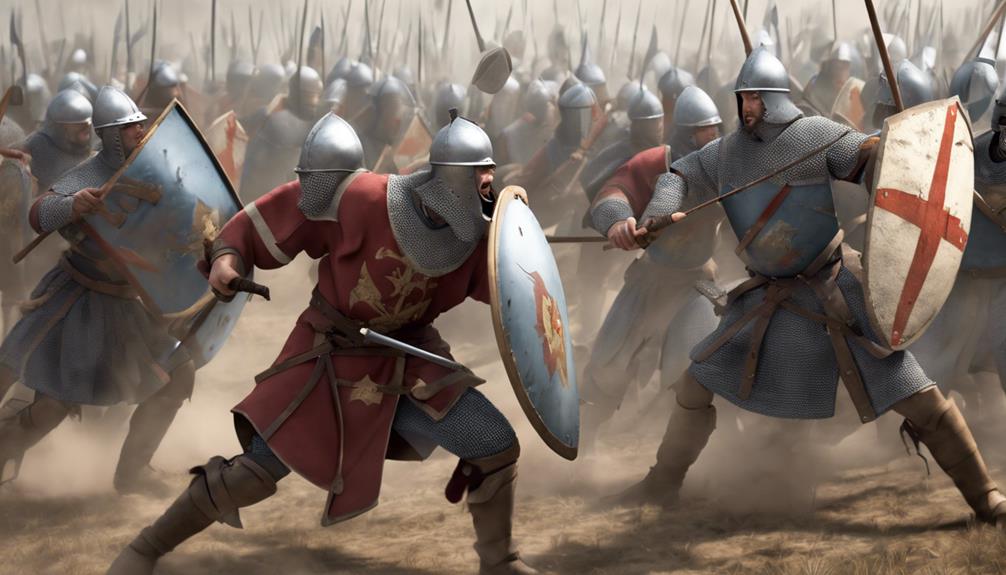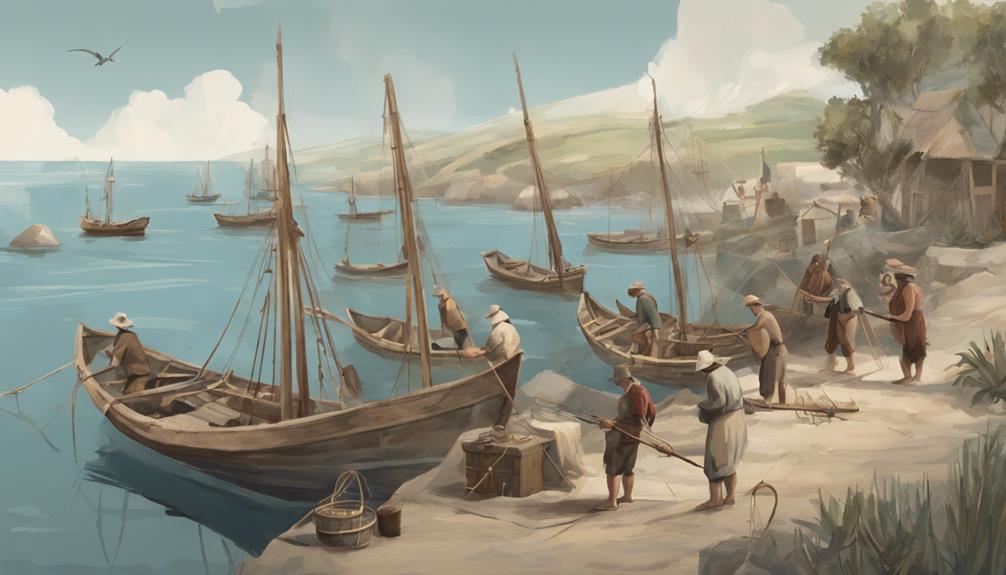Angling emerged in sport fishing history due to its effectiveness in targeting fish with precision and finesse. This technique allowed anglers to adapt to various fish habitats and behaviors, showcasing skill and patience. Through cultural and technological advancements, angling evolved, becoming a symbol of connection to nature and camaraderie within communities. Its economic impact on the fishing industry drives tourism and employment. Angling's sustainable practices foster conservation efforts. The recreational benefits and future trends of angling continue to shape its role in modern fishing practices. Understanding the historical roots of angling reveals its multifaceted significance in sport fishing.
Early Origins of Angling
Sport fishing traces its roots back to ancient civilizations, where early forms of angling were practiced for sustenance and recreation. In the historical context of ancient methods, fishing was crucial for feeding communities and provided a means of survival. Early practices of angling involved using primitive tools like spears, harpoons, and hand lines to catch fish from rivers, lakes, and oceans. These early anglers relied on their knowledge of fish behavior and habitats to successfully procure food for their families.
Ancient methods of angling varied across regions, with each culture developing unique techniques suited to their environment. In Egypt, for example, hieroglyphics depict fishermen using nets to catch fish in the Nile River. In China, the use of silk lines and bamboo rods for fishing dates back thousands of years, showcasing the early innovations in angling equipment. The Greeks and Romans also contributed to the evolution of angling by introducing artificial flies and using different bait to attract fish.
Understanding the historical context of ancient angling methods provides valuable insights into the origins of sport fishing. By studying the primitive tools and early practices of our ancestors, we can appreciate the ingenuity and resourcefulness that laid the foundation for modern angling techniques. The transition from fishing as a means of survival to a recreational sport marks a significant shift in human history, highlighting our enduring fascination with the art of angling.
Evolution of Angling Techniques
The historical lineage of ancient angling methods provides a rich backdrop for examining the intricate evolution of fishing techniques over time. Tackle innovation has been a key driver in the evolution of angling techniques. From the rudimentary handcrafted hooks and lines of antiquity to the sophisticated reels and rods of today, the progression of angling tackle has significantly enhanced the effectiveness and enjoyment of fishing. The development of materials such as carbon fiber and high-strength alloys has led to lighter, more durable equipment that offers increased sensitivity and control, revolutionizing the way anglers approach their craft.
Bait selection has also played a crucial role in the evolution of angling techniques. Early anglers relied on natural baits like worms, insects, and small fish. However, as fishing techniques advanced, artificial baits such as lures and flies gained popularity for their versatility and effectiveness in attracting different species of fish. The art of selecting the right bait for the target species and environmental conditions has become a fundamental skill in angling, with modern advancements in bait design and formulation continually pushing the boundaries of angling success.
Cultural Significance of Angling

Amidst diverse cultures worldwide, angling stands as a timeless practice interwoven with traditions, values, and societal norms. Historical traditions have ingrained angling as more than just a recreational activity but as a cultural cornerstone. In many societies, fishing has been a way of life for centuries, passed down through generations, symbolizing patience, skill, and a deep connection to nature.
The cultural significance of angling extends beyond its historical traditions. It plays a vital role in environmental conservation and awareness. Anglers often act as stewards of the water, promoting sustainable practices and advocating for the protection of aquatic ecosystems. Through catch-and-release programs and habitat restoration efforts, anglers contribute to the preservation of marine life and the overall health of aquatic environments.
Furthermore, angling serves as a means of cultural exchange and community bonding. Fishing tournaments and events bring people together, fostering camaraderie and mutual respect among participants. Shared experiences on the water create lasting memories and strengthen social ties, transcending geographical and cultural boundaries.
Influence of Technology on Angling
With advancements in technology revolutionizing the angling experience, modern fishermen are facing a paradigm shift in their approach to the age-old practice. The influence of technology on angling has been profound, with impactful innovations and technological advancements enhancing the way anglers engage with the sport.
One of the most significant technological advancements in angling is the development of fish finders. These devices utilize sonar technology to locate fish underwater, providing anglers with valuable information about the depth and distribution of fish in a particular area. Fish finders have revolutionized the efficiency of fishing, enabling anglers to target specific areas where fish are more likely to be present.
Another impactful innovation in angling technology is the introduction of lightweight and durable materials in fishing gear. Carbon fiber fishing rods, for example, are stronger and more sensitive than traditional fiberglass rods, allowing anglers to detect even the slightest of bites. Similarly, advancements in fishing reel technology, such as baitcasting reels with magnetic braking systems, have made casting smoother and more precise.
Furthermore, the integration of GPS technology in fishing equipment has enabled anglers to mark productive fishing spots, navigate unfamiliar waters, and track their routes. This level of precision and data accessibility has greatly enhanced the angling experience, making it more efficient and rewarding for modern fishermen.
Economic Impact of Angling
Advancements in angling technology haven't only transformed the way fishermen engage with the sport but have also had a significant economic impact on the fishing industry as a whole. The economic implications of angling extend beyond the mere act of fishing, influencing various sectors such as tourism revenue and employment opportunities.
Angling has become a significant driver of tourism revenue in many regions, attracting fishing enthusiasts from all over the world. This influx of visitors not only boosts local economies through expenditures on accommodations, dining, and other activities but also creates employment opportunities in sectors catering to the angling tourism industry, such as guides, boat rentals, and tackle shops.
Moreover, the economic impact of angling goes hand in hand with sustainable practices. Sustainable angling practices ensure the long-term viability of fish populations, which in turn supports the economic sustainability of the fishing industry. By promoting catch-and-release practices, implementing size and bag limits, and supporting habitat conservation efforts, anglers contribute to the preservation of fish stocks, thus safeguarding the economic benefits derived from recreational fishing.
Conservation Efforts in Angling
Efforts in angling conservation play a crucial role in ensuring the sustainability of fish populations and the long-term health of ecosystems. Sustainable practices are becoming increasingly important in sport fishing to maintain the delicate balance of aquatic environments. Anglers are actively involved in conservation initiatives, recognizing the need to preserve fish populations for future generations.
One key aspect of angling conservation is habitat restoration. Restoring and protecting fish habitats are vital for maintaining biodiversity and ensuring healthy ecosystems. Anglers often engage in habitat restoration projects such as cleaning up waterways, planting vegetation along riverbanks, and creating artificial structures to enhance fish habitats. These efforts help improve the overall health of aquatic ecosystems and benefit fish populations by providing them with suitable breeding and feeding grounds.
Additionally, sustainable practices in angling involve catch-and-release techniques, selective harvesting, and adherence to fishing regulations. Anglers are encouraged to release undersized or excess fish back into the water to support population growth. By practicing responsible fishing methods, anglers contribute to the conservation of fish stocks and help prevent overexploitation of vulnerable species.
Angling's Role in Recreation

Angling remains a popular recreational activity enjoyed by millions of people worldwide, offering a unique connection to nature and the thrill of the catch. Beyond the excitement of reeling in a big fish, angling provides numerous health benefits. Spending time outdoors, breathing in fresh air, and soaking up vitamin D from the sun are just a few ways fishing contributes to your well-being. The tranquility of the water and the rhythmic motion of casting and reeling also promote relaxation, reducing stress and improving mental health.
Moreover, angling is a fantastic way to bond with friends and family. Whether it's a peaceful day on the shore with a loved one or a lively fishing competition among friends, angling fosters social connections and creates lasting memories. The competitive aspect of angling adds an extra layer of excitement, as anglers strive to outdo each other with the size or number of fish caught. This friendly rivalry not only enhances the enjoyment of the sport but also strengthens relationships through shared experiences.
Future Trends in Angling
As angling continues to evolve and adapt to changing environmental and technological landscapes, emerging trends are reshaping the future of this beloved recreational activity for enthusiasts worldwide. Anglers are increasingly focusing on sustainable practices to ensure the long-term health of fish populations and their habitats. This shift towards sustainability involves catch-and-release practices, using biodegradable fishing gear, and participating in habitat restoration projects to preserve ecosystems for future generations.
- Technological Advancements: The integration of advanced technologies such as fish finders, drones for scouting fishing spots, and digital mapping tools is revolutionizing the way anglers approach their sport. These innovations not only enhance the fishing experience but also contribute to conservation efforts by helping anglers target specific species without causing harm to non-targeted fish.
- Online Platforms for Conservation: With the rise of social media and online communities, anglers are leveraging these platforms to raise awareness about sustainable fishing practices and environmental conservation. Through sharing tips, success stories, and advocating for responsible fishing techniques, these online communities play a crucial role in promoting stewardship of aquatic ecosystems.
- Education and Outreach Programs: Organizations dedicated to angling are increasingly investing in educational programs to equip anglers with the knowledge and skills needed to engage in sustainable fishing practices. These initiatives focus on teaching proper handling techniques, ethical angling principles, and the importance of protecting fragile aquatic environments. By empowering anglers with education, the future of angling looks promising in terms of sustainability and environmental stewardship.
Frequently Asked Questions
How Has the Perception of Angling Changed Over Time?
Over time, the perception of angling has evolved significantly due to cultural shifts and historical context. Initially seen as a means of survival, angling transitioned into a leisure activity associated with relaxation and sport.
Modern perspectives reflect changing attitudes towards conservation and ethical fishing practices, highlighting a shift towards sustainability and environmental awareness. This transformation in perception demonstrates society's increased awareness of the impact of angling on aquatic ecosystems and the importance of responsible fishing practices.
What Role Did Superstitions Play in Early Angling Practices?
Superstitions in early angling were deeply intertwined with fishing luck and Ancient beliefs. Anglers followed specific rituals to ensure a bountiful catch, invoking supernatural forces for success. These superstitions ranged from lucky charms to rituals before casting a line, all aimed at influencing the outcome of the fishing trip.
Understanding and respecting these beliefs were crucial for early anglers, shaping their practices and strategies on the water.
Are There Any Famous Angling-Related Myths or Legends?
In the realm of angling folklore, numerous tales have been passed down through generations. Historical legends speak of mythical fish that outsmarted even the most skilled anglers.
Folktales recount encounters with magical creatures of the deep, attributing their elusive nature to supernatural origins. These stories not only entertain but also serve to remind anglers of the mysterious and enchanting nature of the waters they navigate.
What Impact Does Weather Have on Angling Success?
Weather conditions play a crucial role in angling success. Understanding how the weather impacts fish behavior can greatly improve your fishing techniques.
For example, on sunny days, fish may seek shade or deeper waters, requiring you to adjust your approach. Wind can affect casting accuracy and bait presentation.
How Do Different Cultures View the Ethics of Angling?
In different cultures, ethical debates surrounding angling vary widely. Cultural perspectives influence how angling is viewed ethically, with some societies valuing the sport as a tradition and a way to connect with nature, while others may see it as a controversial practice that harms aquatic life.
Understanding these diverse viewpoints is crucial in navigating the complexities of angling ethics and fostering respectful discussions among anglers worldwide.
Conclusion
As you reflect on the emergence of angling in sport fishing history, it becomes evident that this practice has deep roots dating back to ancient civilizations.
Through the evolution of techniques, cultural significance, technological advancements, economic impact, conservation efforts, and recreational value, angling has become a cherished pastime enjoyed by many.
Looking ahead, the future trends in angling promise to continue shaping this beloved sport, ensuring its longevity and relevance in the modern world.



